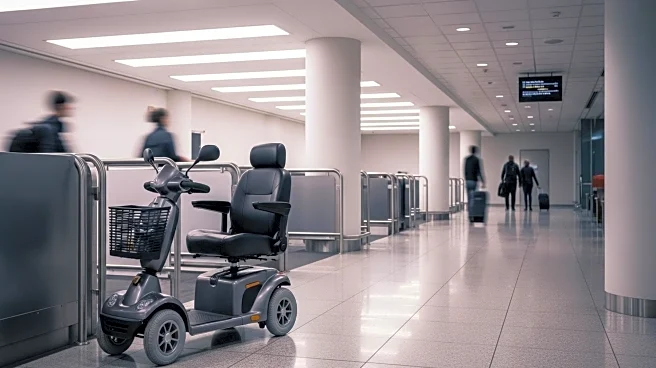What is the story about?
What's Happening?
Dr. Jurai Darongkamas, a clinical psychologist from Birmingham, UK, faced travel difficulties when Qantas refused to allow her mobility scooter on a flight due to its lithium battery. Despite traveling without issue on Thai Airways, Qantas classified her scooter as a personal electronic device rather than a mobility aid, leading to a six-month complaint process. Qantas's policy permits mobility aids with lithium batteries up to 300Wh, provided they can be removed and carried into the cabin. Darongkamas argues that her scooter, the Topmate ES33, meets these criteria and should be considered a mobility aid. The incident highlights inconsistencies in airline policies regarding lithium batteries, prompting disability advocates to call for clearer accessibility standards.
Why It's Important?
The refusal by Qantas to accommodate Darongkamas's mobility scooter underscores the challenges faced by disabled travelers due to inconsistent airline policies. This incident has sparked broader discussions about the need for standardized accessibility regulations across airlines, which could significantly impact the travel industry and disabled passengers. The inconsistency in policies can lead to feelings of powerlessness and discrimination among disabled individuals, highlighting the importance of clear and fair guidelines. The Australian government is working with disability advocates to implement accessibility standards, which could lead to more inclusive travel experiences and potentially influence global airline practices.
What's Next?
The Australian federal government is collaborating with disability advocates to establish clear accessibility standards following the release of the aviation white paper. This initiative aims to address the inconsistencies in airline policies and improve travel experiences for disabled passengers. Additionally, the Albanese government plans to replace the Airline Customer Advocate with an independent aviation ombudsman next year, which could provide more effective resolution of complaints and enhance accountability within the airline industry. These developments may lead to significant changes in how airlines accommodate passengers with specific needs, potentially setting a precedent for international travel standards.
Beyond the Headlines
The incident raises ethical questions about the treatment of disabled individuals in the travel industry and the responsibilities of airlines under discrimination and consumer laws. It highlights the need for airlines to invest in accessible services and the challenges disabled passengers face when dealing with large corporations. The case also emphasizes the importance of communication and transparency between airlines and passengers, as well as the potential for legal and cultural shifts towards more inclusive travel practices.

















